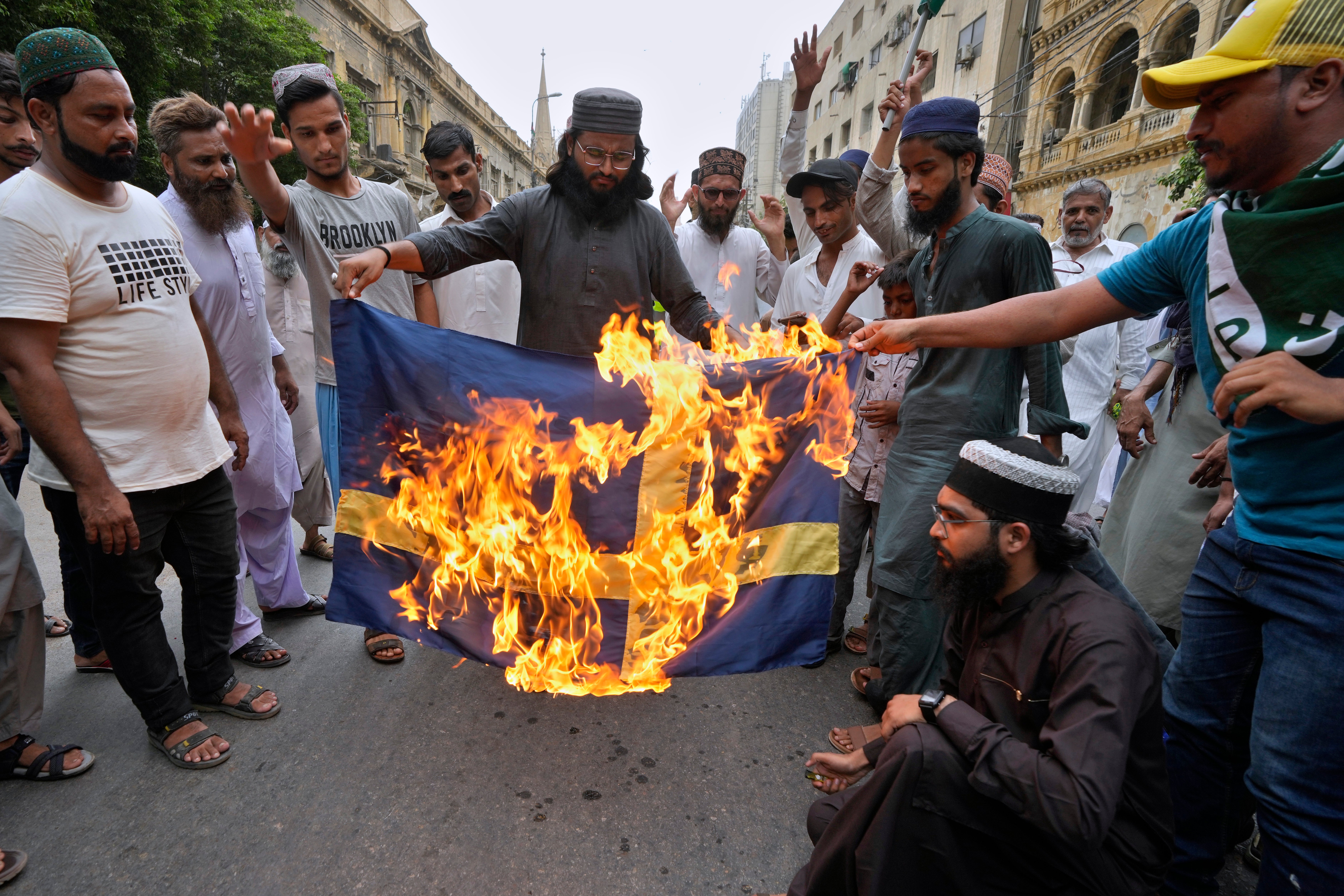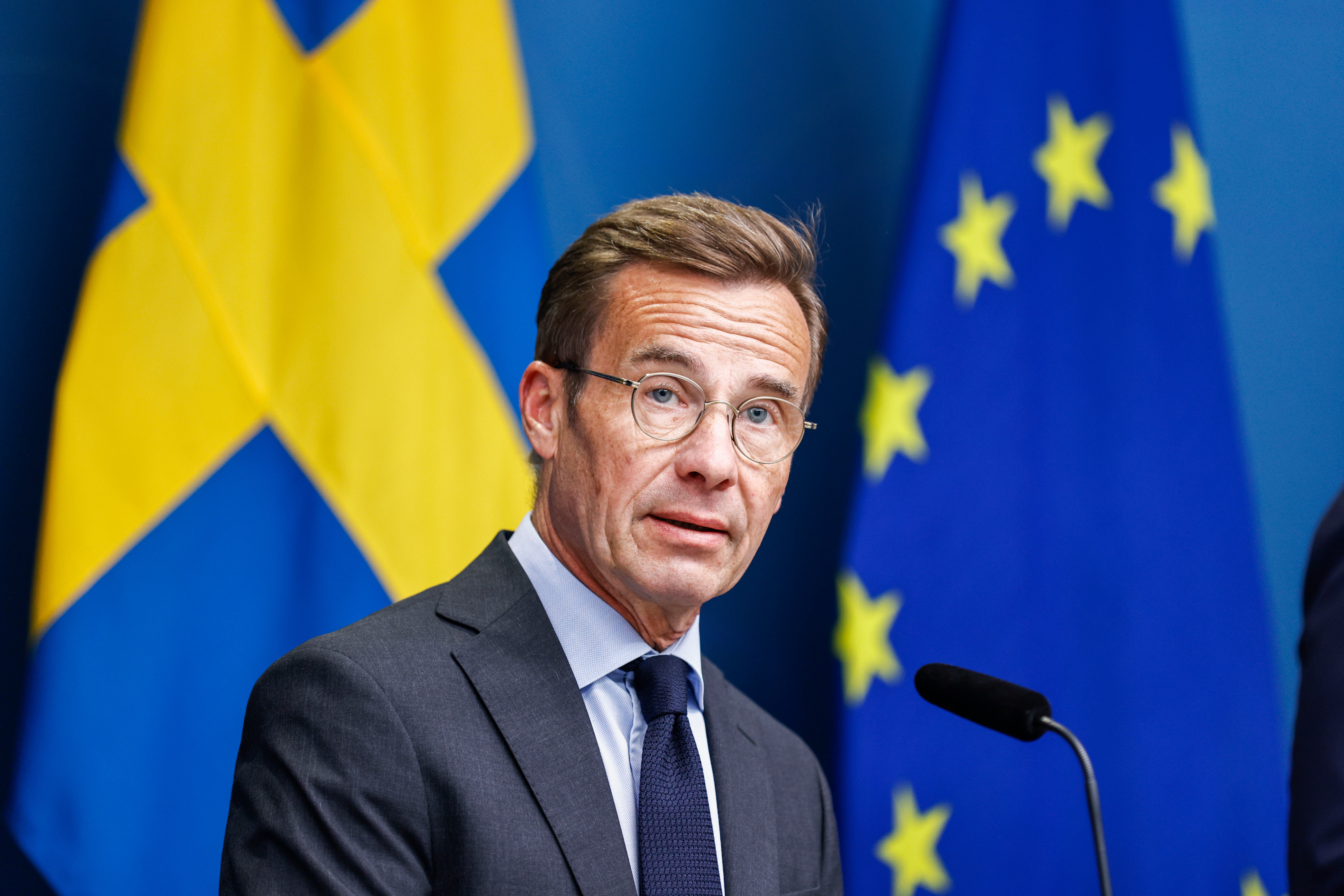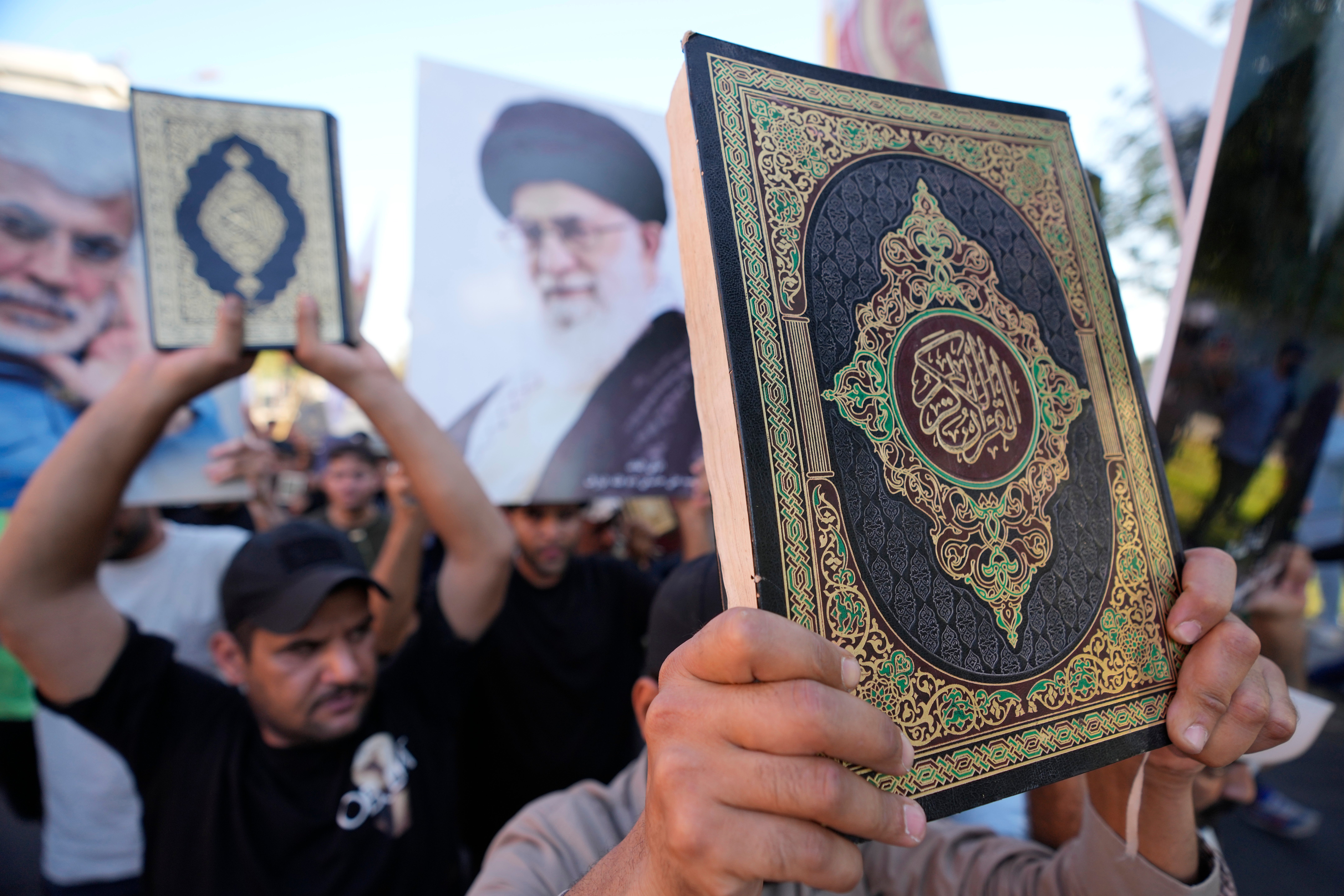Quran burnings have driven Sweden’s terror threat to ‘high’ – so how should they and Denmark deal with the crisis?
Facing a diplomatic backlash from Muslim-majority nations and warnings of violence from jihadist groups, Sweden and Denmark must tread carefully given how deeply freedom-of-speech traditions are embedded in public life. Jakob Illeborg reports from Copenhagen

We know that planned terrorist acts have been prevented,” said the Swedish prime minister, Ulf Kristersson, as the country raised its terror threat level to “high” this week. He warned the public to be vigilant as Sweden and its neighbour Denmark face a violent backlash in parts of the Islamic world over the burning of the Quran in public protests.
Raising the threat level from three, meaning “heightened threat”, to four, “high threat” – the second-highest level – for the first time since 2016, the Swedish security service (Sapo) said that in recent months Sweden had shifted from a “legitimate” to a “prioritised” target for acts of terror. The country is becoming an “increased focus” for Islamist extremists, the head of Sapo – Charlotte von Essen – said, adding that the move was not linked to one particular incident.
Both Denmark and Sweden are tightening security on their borders while accusing Russia of deliberately stoking the fire with disinformation campaigns in the wake of protests abroad over Quran burnings in Scandinavian cities.
The latest came on Friday, when Swedish police detained a woman who had sprayed a man with a fire extinguisher as he staged a Quran-burning protest outside the Iranian embassy in Stockholm. Video footage of the scene showed the woman rushing towards the man and spraying white powder before being intercepted by plainclothes police officers who led her away. A police spokesperson said that the woman, who was not identified by police, had been detained on suspicion of disturbing public order and violence against a police officer.
Free-speech laws have allowed such burnings to take place in both Demark and Sweden over the years – as court challenges to stop these acts were struck down – but the latest crisis has been ramping up since January, when the far-right Danish politician Rasmus Paludan burned a copy of the Quran outside the Turkish embassy in Stockholm. There have been numerous incidents since.
This has created much hand-wringing in both countries, with their leaders hitting out at the burnings. “Everything that is legal is not appropriate. It can be lawful, but still awful,” Kristersson said at a press conference in August.
Bringing in Russia – whose invasion of Ukraine 18 months ago has brought the West together in condemnation – adds an international element beyond the relationships with Muslim-majority countries, which have been deeply scarred by the burnings, and the slow pace of political discussions on what to do about them. What is clear is that stasis is not an option.

Both nations are facing what amounts to the biggest diplomatic crisis in decades, but for Sweden in particular it has become an all-consuming headache. Turkey’s president, Recep Tayyip Erdogan, used the Quran burnings as part of the explanation for his country having held up Stockholm’s application to be a member of Nato, which was submitted at the same time as that of Finland in the wake of the invasion of Ukraine in February last year. While the impasse appears finally to have been broken after intense diplomatic efforts at a summit of alliance members in Lithuania last month, Turkey still has to ratify Sweden’s entry. Finland officially joined in April.
Other countries, from Estonia to the UK, have warned about travel to Sweden, with Britain’s Foreign Office saying in a recent update: “You should be vigilant at this time ... terrorists are very likely to try and carry out attacks in Sweden.”
All this is not to say that Quran burnings are ubiquitous. The culprits behind the burnings can be counted on the fingers of a few hands. They are right-wing extremists. Some of them, like Paludan, have been at it for years, never missing a chance to court the attention such acts inevitably bring.
Quran burners have gone from embassy to embassy, ensuring that their deeds are filmed and posted online. Often, there are next to no witnesses present at these happenings, except for the police and security that follow these activists around – and, of course, the person shooting the video.
The crisis the burnings have caused is very clear. Sweden’s embassy in Baghdad was attacked by an angry mob in mid-July, as was the Swedish embassy in Lebanon on 9 August. In the spring, police arrested four alleged militant Islamists in three Swedish towns on suspicion of terror offences. Meanwhile, counterterrorism officers are also investigating an attack on the Swedish honorary consulate in the western Turkish port city of Izmir, where a Turkish member of staff was shot.
Danish ambassadors in several countries, including Iran and Egypt, have been summoned by their hosts and asked to explain what is happening. Egypt has officially asked the Danish government to end the Quran burnings.

For Copenhagen, it recalls the so-called cartoon crisis from 2005 to 2006, when cartoons depicting the prophet Muhammad were printed in the Danish newspaper Jyllandsposten. Lasting for months, that particular crisis led to more than 100 deaths in angry protests around the world. In 2005, the then-prime minister, Anders Fogh Rasmussen, declined an invitation to meet with representatives from Muslim-majority nations. He would make a speech in early 2006 saying that he hoped “that we have reached a point where we can return to a constructive dialogue between the people of Denmark and the Muslim world”.
This time, the Danish foreign minister, Lars Lokke Rasmussen, quickly reached out to the Organisation of Islamic Countries to condemn the Quran burnings. The Danish government is now trying to find a way to make the burning of religious books and symbols illegal – no doubt aware of the massive hit to Danish exports to Islamic countries last time round, and eager to avoid another stand-off with the Muslim world.
Several members of the current coalition government voted to remove an existing blasphemy law in 2017 that would have made Quran burnings illegal. Rasmussen, who was prime minister in 2017, declared himself proud of removing the blasphemy law, allowing a free and open dialogue. Today, he appears to see things differently.
“It is a despicable act to offend others’ religious belief. This is true when it comes to burning Qurans as well as other religious symbols. These acts have no other purpose but to provoke and cause division,” Rasmussen wrote in a statement in July.
His call for action to prevent the Quran burnings has led to cries of hypocrisy in some quarters. “The Danes have a right to know which side the government is on: Danish freedoms or the Muslim governments who want to curtail them,” writes Leny Malacenski in the broadsheet Weekendavisen.
In Sweden, the long-standing consensus of welcoming migrants to Swedish shores has been challenged after far-right party the Sweden Democrats (Sverigesdemokratarna), took 20.5 per cent of the vote in the 2022 elections, becoming the second-largest party in parliament. A “confidence and supply” agreement with the far-right party props up Kristersson’s minority coalition. When asked about this on Thursday, Kristersson said that some Swedes should “reconsider how you express yourself”.
He added: “There is no reason to intentionally offend someone else, because it actually risks threatening Sweden.”
The Swedish prime minister is undoubtedly feeling the heat. Adding to this is the text message from an unknown source that has been sent to numerous recipients in Denmark and Sweden. “Setting fire to the holy Quran shows Sweden and the Western countries’ hypocrisy and treason,” the text reads, along with a link offering 350,000 krona (about £25,000) for the politician Paludan “dead or alive”, according to the Swedish public broadcaster SVT.
Finding a way to appease both free-speech hardliners and those who seek a change to the law will prove difficult for Kristersson, meaning that the crisis is likely to drag on. Linking the spread of disinformation about the Quran burnings to Russia may provide added impetus.
“We are using a lot of resources to build partnerships and alliances based on two principles: there is a war in Europe, and we need global backing for a good solution for Ukraine, and that the West is losing influence in the world. This means that we simply must do what we can to make sure we have good partners on the international scene,” the Danish prime minister, Mette Frederiksen, recently wrote in Weekendavisen.
But the path will not be easy. Quite rightly, neither Sweden nor Denmark wants to risk their links with international partners, but the problem they must reckon with is how to reconcile this with the free-speech laws and traditions that are deeply embedded in both nations.






Join our commenting forum
Join thought-provoking conversations, follow other Independent readers and see their replies
Comments